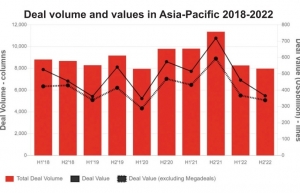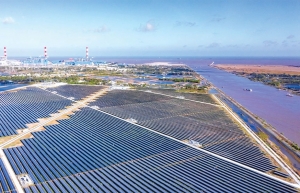Concocting a defensive M&A strategy to build resilience
What are the most significant merger and acquisition (M&A) trends you anticipate for Vietnam in 2023?
 |
| Le Viet Anh Phong, financial advisory lead at Deloitte Vietnam |
The last few years have taken their toll on many businesses. Moreover, prolonged unfavourable macroeconomic developments in the world and Vietnam with inflation, high interest rates, volatile financial markets, and weak demand will impact financial performance as well as the liquidity of businesses.
Financial performance and liquidity have been the key challenges for Vietnamese businesses since the onset of the pandemic. The recent weakening of financial markets has even made the liquidity problem more severe. As such, strengthening the balance sheet to continue business operations has become the priority for many companies in Vietnam.
As a result, the defensive M&A strategy is expected to deploy more deals to optimise portfolios, generate liquidity to grow core businesses, and ultimately strengthen balance sheets.
Some will recalibrate/optimise their portfolio by divesting non-core assets to free up the working capital. In addition, as sustainability is central to the investment approach nowadays, many companies are also re-examining their existing business through an environmental, social, and governance (ESG) perspective and identifying incompatible assets to divest.
The 2022 Deloitte Global Divestiture survey found that seven in 10 companies are considering making two or more divestments in the next two years, as they continue to focus on building resilience. This can help ensure a company stays adaptable, and prepared to deal with complex and unpredictable events. Then, when resilient models are shaped, businesses can think of moving to an offensive strategy to aim for transformative progress.
In terms of buyers, we continue to see strong interest from strategic investors from Japan. Out of the executed transactions that Deloitte Vietnam’s professionals were exclusive advisors of in the last three months, three-quarters of strategic investors were from Japan. Positive signals are also coming from Singapore, Taiwan, Hong Kong, and Europe.
We have also observed that valuation expectations are softening, thus narrowing the valuation gap, which is undisputedly the top dealbreaker in Vietnam so far.
What sectors do you see as most active in terms of M&A this year?
Last year, the main sectors attracting M&A included consumer, energy, and real estate. Renewable energy, one of the most active areas of 2022, is expected to attract more investors in the upcoming year. We believe that deals in healthcare, education, and consumer-enabler sectors are forecast to remain active in 2023 whilst the rest will be more opportunistic.
In consumer products and logistics, deals are expected to happen as there is a market opportunity for consolidation and vertical expansion for cash-rich companies. In the banking sector, we may see more transactions to raise their capital adequacy ratio to grow and deal with the turbulent period in financial markets and the potential deteriorating quality of the loan book due to unfavourable market conditions.
Companies in these industries also should approach sustainability through an ESG lens as sustainability is among of top concerns of investors. Some 54 per cent of global investors who participated in Deloitte’s survey consider sustainable investing to be fundamental to investment processes and outcomes, and 77 per cent of fund selectors consider sustainability and climate factor analysis to be an integral part of sound investing.
How do you predict the volume and value of M&A deals in Vietnam will compare to previous years?
Last year was a low point for Vietnam, and the global M&A market was unpredictable due to geopolitical conflicts and a high-interest rate environment.
However, private equity still has a lot of dry powder to deploy, and we anticipate for them to be highly active in the market. Although Vietnam’s economy is expected to experience slower growth in the short term, all the macro factors are well intact in the long run. The general sentiment among the private equity houses is that this year will be an interesting time to do a deal in Vietnam.
From my viewpoint, deal value in 2023 will be higher, mainly driven by more mega deals. However, in terms of deal counts, the volume may drop as investors in general are still very selective.
What factors will drive M&A activity in Vietnam in 2023, and what advice would you give to companies looking to pursue deals?
Looking further to the rest of 2023 and beyond, dealmaking is likely to accelerate and there will be transactions to be looking for. Other than those already discussed, the return of activity will greatly depend on the confidence of the ultimate consumers in Vietnam and also our key export markets. Purchasing power seemed to deteriorate in Q4 of 2022, and has yet shown signs of strong recovery.
In addition, lower interest rates, a stronger financial market, and supportive regulatory changes in Vietnam definitely will help drive the volume of transactions.
No matter whether you are on the buying or selling side, always be prepared. The expectation to do a quick transaction is legitimate. However, that is only possible when things are prepared with your business, your financial performance, and a solid well thought business plan. You should be well-informed of the full process, the resources required to execute it successfully, and the associated risks to mitigate. Also, investors and sellers should take a longer-term view to close the gap.
Deal structure is also a helpful tool to consider to better align the interests of all parties. This is even more critical during this challenging period.
 | The state of play in healthcare M&As Merger and acquisition moves are one of the more effective measures for foreign investors entering the Vietnamese medical and pharmaceutical industry, utilising available factories and inexpensive labour. Ngo Thanh Hai, Nguyen Dieu Quynh, and Le Anh Thu from LNT & Partners offers an overview of the factors and barriers involved when it comes to dealmaking in pharma. |
 | Tech groups hope for boost via M&As Driven by acceleration in digital transformation, technology is emerging as a high-potential industry for merger and acquisition transactions in Vietnam. |
 | Global CEOs resolute in M&As Global merger and acquisition (M&A) activities will likely rise later in 2023 as investors and executives look to balance short-term risks with their long-term business transformation strategies, according to PwC’s 2023 Global M&A Industry Trends Outlook. |
 | Legal due diligence and major red flags for energy projects Mergers and acquisitions can play a critical role for the power sector to flourish with a boosted financial model for investors with distinct appetite. Vaibhav Saxena, lawyer at Vilaf, looks at existing assets, assets under construction, and planned projects that have a special purpose vehicle. |
 | Vibrant activity felt with real estate M&A Merger and acquisition activities in the first months of the year surged with several huge deals, signalling the Vietnamese market is ready to welcome foreign investors into projects thirsty for capital. |
What the stars mean:
★ Poor ★ ★ Promising ★★★ Good ★★★★ Very good ★★★★★ Exceptional
Related Contents
Latest News
More News
- Kurz Vietnam expands Gia Lai factory (February 27, 2026 | 16:37)
- SK Innovation-led consortium wins $2.3 billion LNG project in Nghe An (February 25, 2026 | 07:56)
- THACO opens $70 million manufacturing complex in Danang (February 25, 2026 | 07:54)
- Phu Quoc International Airport expansion approved to meet rising demand (February 24, 2026 | 10:00)
- Bac Giang International Logistics Centre faces land clearance barrier (February 24, 2026 | 08:00)
- Bright prospects abound in European investment (February 19, 2026 | 20:27)
- Internal strengths attest to commitment to progress (February 19, 2026 | 20:13)
- Vietnam, New Zealand seek level-up in ties (February 19, 2026 | 18:06)
- Untapped potential in relations with Indonesia (February 19, 2026 | 17:56)
- German strengths match Vietnamese aspirations (February 19, 2026 | 17:40)

 Tag:
Tag:




















 Mobile Version
Mobile Version